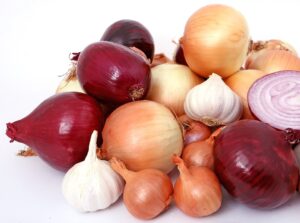Health Benefits of Onions
The Comprehensive Health Benefits of Onions: Nature's Versatile Medicinal Vegetable

Onions (Allium cepa) are one of the most widely cultivated and consumed vegetables in the world. Known for their distinct flavor and culinary versatility, onions are not only a staple in many cuisines but also a powerhouse of essential nutrients and bioactive compounds. This article explores the extensive health benefits of onions, supported by scientific research and traditional wisdom.
Nutritional Profile
Onions are low in calories but rich in vitamins, minerals, and antioxidants. A typical serving of onions (about 100 grams) provides:
- Calories: 40
- Carbohydrates: 9.3 grams
- Protein: 1.1 grams
- Fiber: 1.7 grams
- Vitamin C: 12% of the Daily Value (DV)
- Vitamin B6: 5% of the DV
- Folate: 4% of the DV
- Potassium: 4% of the DV
- Manganese: 6% of the DV
Onions also contain trace amounts of calcium, iron, magnesium, phosphorus, and various other nutrients. They are rich in antioxidants, particularly flavonoids such as quercetin, which contribute to their numerous health benefits.
Health Benefits of Onions
1. Rich in Antioxidants
Onions are a potent source of antioxidants, which help combat oxidative stress and reduce inflammation in the body. The flavonoids and polyphenols in onions, especially quercetin, have been shown to neutralize free radicals, protecting cells from damage and reducing the risk of chronic diseases such as cancer and heart disease.
2. Supports Heart Health
Onions contribute to heart health through multiple mechanisms. The antioxidants in onions help reduce inflammation and prevent oxidative damage to the heart and blood vessels. The sulfur compounds in onions help lower blood pressure, improve cholesterol levels, and reduce the risk of blood clot formation, all of which are crucial for maintaining a healthy cardiovascular system.
3. Enhances Immune Function
Onions are known for their immune-boosting properties. The vitamin C and other antioxidants in onions enhance the immune system by increasing the production and function of white blood cells. Onions also have antimicrobial properties, which help protect against various infections and illnesses. Regular consumption of onions can help reduce the severity and duration of common colds and respiratory infections.
4. Anti-Inflammatory Properties
Chronic inflammation is a common underlying factor in many diseases, including heart disease, diabetes, and arthritis. The anti-inflammatory compounds in onions, such as quercetin and sulfur compounds, help reduce inflammation in the body. These compounds inhibit the production of pro-inflammatory cytokines and enzymes, providing relief from inflammatory conditions.
5. Supports Digestive Health
The dietary fiber in onions promotes healthy digestion by supporting regular bowel movements and preventing constipation. Onions also contain prebiotics, which are beneficial for maintaining a healthy gut microbiome. Prebiotics provide nourishment for beneficial bacteria in the gut, enhancing overall digestive health and reducing the risk of gastrointestinal disorders.
6. Regulates Blood Sugar Levels
Onions have been shown to help regulate blood sugar levels, making them beneficial for people with diabetes. The sulfur compounds in onions, such as S-methylcysteine and quercetin, help improve insulin sensitivity and reduce blood sugar levels. Including onions in the diet can help manage blood glucose levels and reduce the risk of complications associated with diabetes.
7. Promotes Bone Health
Onions contain various compounds that support bone health, including calcium, magnesium, and vitamin K. These nutrients are essential for maintaining bone density and strength. Additionally, some studies suggest that the flavonoids in onions may help increase bone mineral density, reducing the risk of osteoporosis and other bone-related conditions.
8. Aids in Weight Management
Onions are low in calories and high in fiber, making them an excellent addition to a weight management plan. The fiber in onions promotes a feeling of fullness, reducing overall calorie intake. Onions also contain compounds that help boost metabolism and promote fat loss, making them a valuable food for weight control.
9. Supports Skin Health
The antioxidants and vitamins in onions play a vital role in maintaining healthy skin. Vitamin C is crucial for collagen production, which helps keep the skin firm and elastic. The sulfur compounds in onions have antibacterial properties, which can help prevent acne and other skin infections. Applying onion juice topically has been used in traditional medicine to improve skin texture and reduce scars.
10. May Have Anti-Cancer Properties
Several studies suggest that onions have potential anti-cancer properties. The sulfur compounds and flavonoids in onions have been shown to inhibit the growth of cancer cells and induce apoptosis (programmed cell death) in various types of cancer, including colorectal, breast, and prostate cancer. The antioxidants in onions also help protect cells from DNA damage, reducing the risk of cancer development.

Culinary Uses of Onions
Onions are incredibly versatile and can be used in various culinary applications:
- Raw: Add raw onions to salads, sandwiches, and salsas for a crunchy texture and sharp flavor.
- Cooked: Sauté, roast, grill, or caramelize onions to enhance the flavor of soups, stews, and sauces.
- Pickled: Enjoy pickled onions as a tangy and crunchy topping for tacos, burgers, and salads.
- Baked: Use onions in savory baked dishes like quiches, tarts, and casseroles.
- Flavor Base: Onions are often used as a base for soups, stocks, and sauces, providing depth and richness to dishes.
Tips for Selecting and Storing Onions
When selecting onions, choose bulbs that are firm, dry, and free from soft spots or sprouting. Store onions in a cool, dry, well-ventilated place away from direct sunlight to maintain their freshness. Avoid storing onions near potatoes, as they can absorb moisture and gases from the potatoes, leading to spoilage.
Onions are a nutrient-dense vegetable with a wide array of health benefits. From their potent antioxidant and anti-inflammatory properties to their role in supporting heart, immune, and digestive health, onions offer numerous advantages for overall well-being. Their versatility in the kitchen and potent therapeutic properties make them an invaluable addition to a healthy diet. Incorporate onions into your daily meals to experience the remarkable benefits of this humble yet powerful vegetable.



